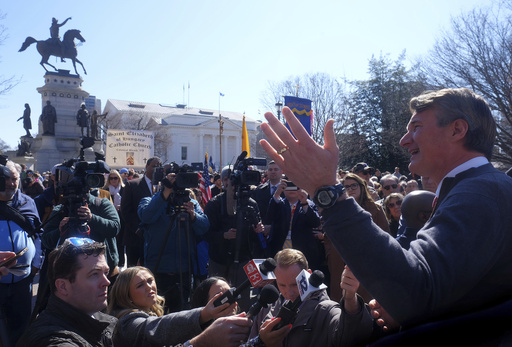RICHMOND, Va. (AP) — Gov. Glenn Youngkin and Lt. Gov. Winsome Earle-Sears, both Republicans, joined thousands of Virginia activists Wednesday for an annual anti-abortion demonstration, where attendees denounced Democratic lawmakers who have blocked proposed restrictions since the Supreme Court overturned Roe v. Wade.
Earle-Sears, who addressed a rally just outside the Capitol before attendees marched through downtown Richmond, joined other speakers in calling for housing, support and other resources for expectant parents. She also expressed compassion for women who have had abortions and exhorted attendees to keep up their advocacy.
“Let’s pray that hearts will be changed. Let’s pray that our legislators will change and the laws will change,” said Earle-Sears, whose voice broke with emotion at the start of her remarks.
After the U.S. Supreme Court’s 2022 decision ending constitutional protections for abortion and allowing states to enact bans, Youngkin said he hoped lawmakers in the then-politically divided General Assembly would enact new limits. He asked them to send a bill to his desk banning abortions after 15 weeks of pregnancy with exceptions for rape, incest and the life of the mother.
Democrats — who criticized Youngkin’s participation in Wednesday’s events — defeated that bill and other proposed abortion restrictions in last year’s legislative session. In the fall election cycle, when every seat was on the ballot, Republicans in many competitive districts coalesced around Youngkin’s proposed 15-week ban, while Democrats focused on protecting existing abortion rights or further expanding them.
Democrats see the issue as a key part of the reason they held the state Senate and flipped control of the House of Delegates.
Voters sent a message that they don’t want politicians in Richmond “dictating their health care,” said Democratic Del. Candi Mundon King, who told reporters that Republican-backed attempts to limit abortion would threaten women’s lives.
This year, the Democratic legislative majority has defeated new proposed limits on abortion access — with one near-total ban going down on a bipartisan basis. Democrats are also advancing measures proponents say are intended to protect women who might seek an abortion in Virginia from potential prosecution in other states.
At the rally, other speakers criticized Democrats as extreme and warned of the fight ahead over an effort to enshrine abortion rights into the state’s constitution, which would require voter approval.
Democratic lawmakers introduced a proposed amendment this year but opted to delay debate on it until next year’s session, a move that won’t affect the timeline by which it could go to voters for consideration, in 2026 at the earliest.
Wednesday’s demonstration included students, families and faith leaders. Attendees held signs that said, “Virginia is for babies,” and, “I am the post-Roe generation.” They gathered for speeches and prayer before marching through downtown streets around the Capitol.
The Division of Capitol Police estimates 3,000 to 3,500 people participated, according to spokesman Joe Macenka.
Speaking briefly to reporters before the march began, Youngkin said he did not believe his pursuit of a 15-week ban was a mistake.
He reiterated his position that Virginia, a narrowly politically divided state, can “come together” around what he calls reasonable limits on abortion access.
“I think we should continue to talk about it,” he said.
Republican Attorney General Jason Miyares spoke at last year’s rally. He told the crowd he opposed the concept of women being prosecuted for seeking abortions, saying the anti-abortion movement should focus its efforts on backing the work of charities that support struggling mothers.
The anti-abortion movement is not wholly unified on that issue.
On Wednesday, attendees at the rally held a sign that said: “Stop excusing women. Criminalize abortion.”
Jamie Lockhart, executive director of Planned Parenthood Advocates of Virginia, said in a written statement that the marchers were part of “a vocal minority who do not represent the wants or needs of the majority of Virginians.”
“Virginians want to live in a place where everyone feels empowered to make decisions about their own reproductive futures and health without fear of judgment or interference,” she said.


